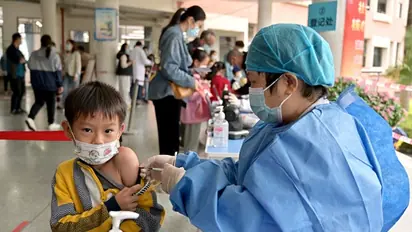Amid COVID outbreak, Beijing seals mall, locks down residential compounds

Synopsis
According to local media, six additional cases were discovered Thursday morning in Beijing's central districts of Chaoyang and Haidian, close connections of those infected recently in northeastern Jilin province.
As the newest epidemic spreads to Beijing's central districts, police have cordoned off a mall and locked down numerous residential compounds due to a Covid flare-up. Thanks to snap lockdowns, mass testing, and travel restrictions, the coronavirus has been primarily contained in China. Still, officials are on high alert following a national rise related to domestic travel in the last month. According to local media, six additional cases were discovered Thursday morning in Beijing's central districts of Chaoyang and Haidian, close connections of those infected recently in northeastern Jilin province.
The Raffles City mall in Dongcheng, a key area in the capital, was locked down, according to the Beijing Youth Daily, after a close contact of a person with Covid-19 was discovered to have visited the mall. Its entrances were sealed, and no personnel or customers were permitted to leave until they were tested. The mall was still shuttered on Thursday. The most recent rise happened in Beijing at a high-level conference of crucial Communist Party leaders.
Also Read | ‘In our hands, COVID pandemic will end when the world chooses to end it’: WHO chief Dr Tedros
At a press conference, Beijing health officials stated that more than 280 close connections had been discovered, with about 12,000 people examined for the virus in both Chaoyang and Haidian districts. The official said this cluster epidemic was unexpected, with multiple locations covering a vast territory. It affects a large number of people, and prevention and control are extremely tough. Five residential complexes, a primary school, and two office campuses were placed on lockdown early Thursday, preventing tens of thousands of inhabitants from exiting and forcing them to undergo mass testing.
As most countries relax coronavirus restrictions, China maintains its firm zero-Covid policy, which has kept its international borders essentially closed since the outbreak began. Its most recent round of diseases has left millions on lockdown and increased internal travel restrictions, with many flights and trains cancelled.